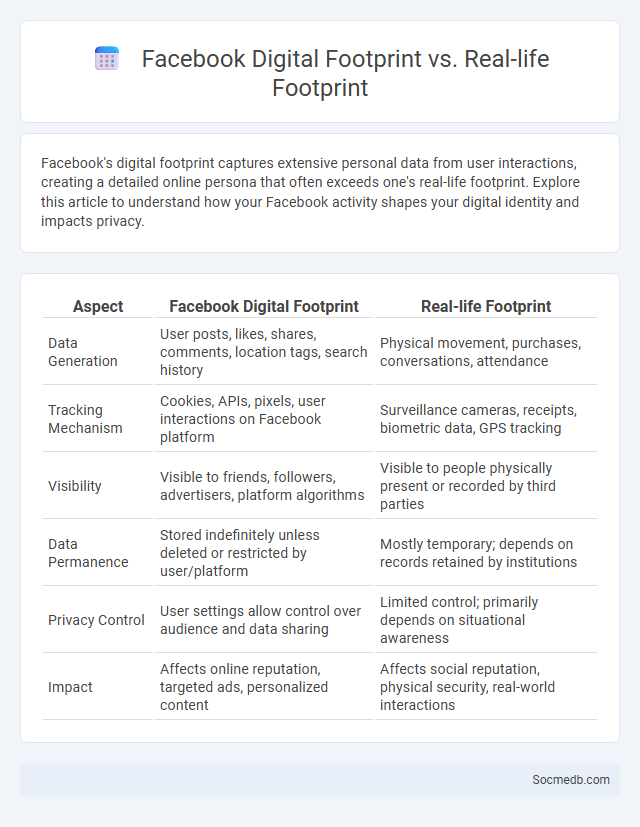
Photo illustration: Facebook Digital Footprint vs Real-life Footprint
Facebook's digital footprint captures extensive personal data from user interactions, creating a detailed online persona that often exceeds one's real-life footprint. Explore this article to understand how your Facebook activity shapes your digital identity and impacts privacy.
Table of Comparison
| Aspect | Facebook Digital Footprint | Real-life Footprint |
|---|---|---|
| Data Generation | User posts, likes, shares, comments, location tags, search history | Physical movement, purchases, conversations, attendance |
| Tracking Mechanism | Cookies, APIs, pixels, user interactions on Facebook platform | Surveillance cameras, receipts, biometric data, GPS tracking |
| Visibility | Visible to friends, followers, advertisers, platform algorithms | Visible to people physically present or recorded by third parties |
| Data Permanence | Stored indefinitely unless deleted or restricted by user/platform | Mostly temporary; depends on records retained by institutions |
| Privacy Control | User settings allow control over audience and data sharing | Limited control; primarily depends on situational awareness |
| Impact | Affects online reputation, targeted ads, personalized content | Affects social reputation, physical security, real-world interactions |
Introduction to Digital and Real-life Footprints
Your digital footprint consists of all the online data you create through social media interactions, posts, and searches, leaving a trail that reflects your personal and professional identity. Real-life footprints encompass your offline actions and behaviors that also shape your reputation and influence how others perceive you. Understanding both footprints helps you manage privacy, security, and your overall digital presence effectively.
Defining Facebook Digital Footprint
A Facebook digital footprint encompasses all the data generated by a user's interactions, including posts, comments, likes, shares, and profile information. This footprint reflects an individual's online behavior and preferences, contributing to targeted advertising and personalized content algorithms. Managing one's Facebook digital footprint is essential for privacy protection and controlling personal information exposure.
Understanding Your Real-life Footprint
Understanding your real-life footprint involves analyzing how your offline actions influence your online presence and vice versa. Social media platforms track location data, personal preferences, and interactions, which contribute to a comprehensive digital profile reflecting your real-world behavior. Protect Your privacy by managing settings and being mindful of the information you share both online and offline to maintain control over your digital footprint.
The Broader Scope of Digital Footprints
Social media platforms generate extensive digital footprints that extend beyond your visible interactions, capturing data such as location tags, device information, and browsing habits. These footprints influence online reputation and targeted advertising, impacting privacy and personal security. Understanding the broader scope of digital footprints helps you manage your online presence more effectively and safeguard sensitive information.
Key Differences: Facebook vs. General Digital Footprint
Facebook centers on curated personal profiles and direct social interactions, where You control friend lists, posts, and privacy settings. Your general digital footprint includes all online activities beyond social networks, such as browsing history, app usage, and public records, often tracked without explicit consent. Unlike Facebook's structured platform, the digital footprint encompasses a broader, less visible spectrum of data that shapes online identity and behavior profiling.
How Real-life Actions Shape Your Digital Identity
Real-life actions significantly influence your digital identity by creating a consistent narrative across online platforms through shared experiences, opinions, and behaviors. Social media algorithms analyze offline behaviors reflected in digital interactions, impacting content visibility and audience perception. Authentic engagement, such as community involvement or professional achievements, reinforces a credible online persona that aligns with real-world values and reputation.
Overlap Between Facebook and Broader Digital Footprints
Facebook plays a significant role in shaping broader digital footprints through its extensive data collection across user interactions, preferences, and connected applications. The platform's integration with other digital services creates overlapping data points that enhance user profiling for targeted advertising and personalized content delivery. Understanding this overlap is crucial for privacy management and developing strategies to mitigate data exploitation in digital ecosystems.
Privacy Risks: Facebook and Beyond
Social media platforms like Facebook collect extensive personal data, increasing risks of privacy breaches and unauthorized data sharing. Users face threats such as identity theft, targeted advertising abuse, and surveillance from both corporations and malicious actors. Implementing strict privacy settings and using encrypted communication tools can mitigate some of these risks while maintaining social connectivity.
Managing and Minimizing Your Footprints
Managing and minimizing your social media footprints involves regularly reviewing privacy settings and limiting the amount of personal information shared online. Utilize tools to delete old posts, control friend lists, and restrict app permissions to reduce digital exposure. Your proactive approach to footprint management enhances online privacy and protects your personal data from unauthorized access.
Future Implications for Digital and Real-life Identity
Emerging trends in social media are reshaping how digital and real-life identities intertwine, meaning your online presence increasingly influences your offline reputation and opportunities. Advances in AI-driven personalization and augmented reality are creating more immersive and authentic virtual interactions that blur boundaries between physical and digital selves. Protecting privacy and managing personal data will become critical as social platforms evolve, demanding proactive strategies to safeguard your identity across both realms.
 socmedb.com
socmedb.com